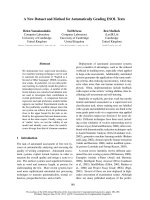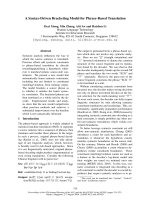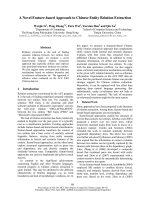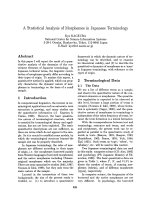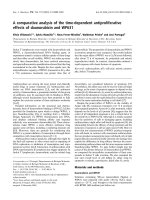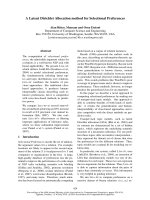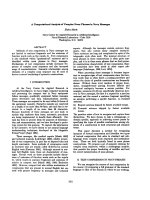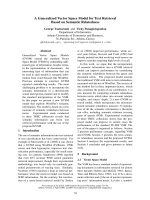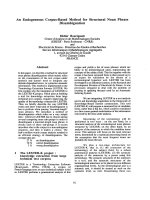Báo cáo khoa học: "A Morphological Analysis Based Method for Spelling Correction" docx
Bạn đang xem bản rút gọn của tài liệu. Xem và tải ngay bản đầy đủ của tài liệu tại đây (97.14 KB, 1 trang )
A Morphological Analysis Based Method for Spelling Correction
Aduriz I., Agirre E., Alegria I., Arregi X., Arriola J.M, Artola X., Diaz de Ilarraza A.,
Ezeiza N., Maritxalar M., Sarasola K., Urkia M.(*)
Informatika Fakultatea, Basque Country University. P.K. 649. 20080 DONOSTIA (Basque Country)
(*) U.Z.E.I. Aldapeta, 20. 20009 DONOSTIA (Basque Country)
1 Introduction
Xuxen is a spelling checker/corrector for Basque which
is going to be comercialized next year. The checker
recognizes a word-form if a correct morphological
breakdown is allowed. The morphological analysis is
based on two-level morphology.
The correction method distinguishes between ortho-
graphic errors and typographical errors.
• Typographical errors (or misstypings) are uncogni-
tive errors which do not follow linguistic criteria.
• Orthographic errors are cognitive errors which occur
when the writer does not know or has forgotten the
correct spelling for a word. They are more persistent
because of their cognitive nature, they leave worse
impression and, finally, its treatment is an interest-
ing application for language standardization purposes.
2 Correction Method in Xuxen
The main problems found in designing the
checking/correction strategy were:
• Due to the high level of inflection of Basque, it is
impossible to store every word-form in a dictionary;
therefore, the mainstream checking/correction
methods were not suitable.
•
Because of the recent standardization and widespread
dialectal use of Basque, orthographic errors are more
likely and therefore their treatment becomes critical.
• The word-forms which are generated without
linguistic knowledge must be fed into the spelling
checker to check whether they are correct or not.
In order to face these issues the strategy used is
basically the following (see also Figure 1).
Handling orthographic
errors
The treatment of orthographic errors is based on the
parallel use of a two-level subsystem designed to detect
misspellings previously typified. This subsystem has
two main components:
• Additional two-level rules describing the most likely
changes that are produced in the orthographic errors.
Twenty five new rules have been defined to cover the
most common orthographic errors. For instance, the
rule
h:
0 => V:V V:V describes that between
vowels the h of the lex-:cal level may dissapear in the
surface. In this way bear, typical misspelling of
behar (to need), will be detected and corrected.
• Additional morphemes linked to the corresponding
correct ones. They describe particular errors, mainly
dialectal forms. Thus, using the new entry tikan,
dialectal form of the ablative singular, the system is
able to detect and correct word-forms as etxe-
tikan, kaletikan
(vm4ants
of etxetik
(from me home), kaletik (from me s~eeO )
~ I~ L ,,~'~', J '=='=
Figure 1 - Correcting strategy in Xuxen
When a word-form is not accepted by the
checker the
orthographic error subsystem is added and the system
retries the morphological checking. If the incorrect form
can be recognized now (1) the correct lexical level form
is directly obtained and, (2) as the two-level system is
bidirectional, the corrected surface form will be
generated from the lexical form.
For example, the complete correction process of
the
word-form beartzetikan (from the need), would be
the following:
beart zet ikan
$ (t)
behar tze tikan(tik)
~L (2)
behartzetik
Handling tyPographical errors
The treatment of typographical errors is quite
conventional
and
performs the following steps:
•
Generating proposals
to
typographical errors using
Damerau's classification.
• Trigram analysis. Proposals with trigrams below a
certain probability treshold are discarded, while the
rest are classified in order of trigramic probability.
• Spelling checking of proposals.
To speed up this treatment the following techniques
have been used:
• If during the original morphological checking of
the
misspelled word a correct morpheme has been found,
the criteria of Damerau are applied only to the unre-
cognized part. Moreover, on entering the proposals
into the checker, the analysis starts from the state it
was at the end of the last recognized morpheme.
• The number of proposals is also limited by filtering
the words containing very low frequency u'igrams.
463
